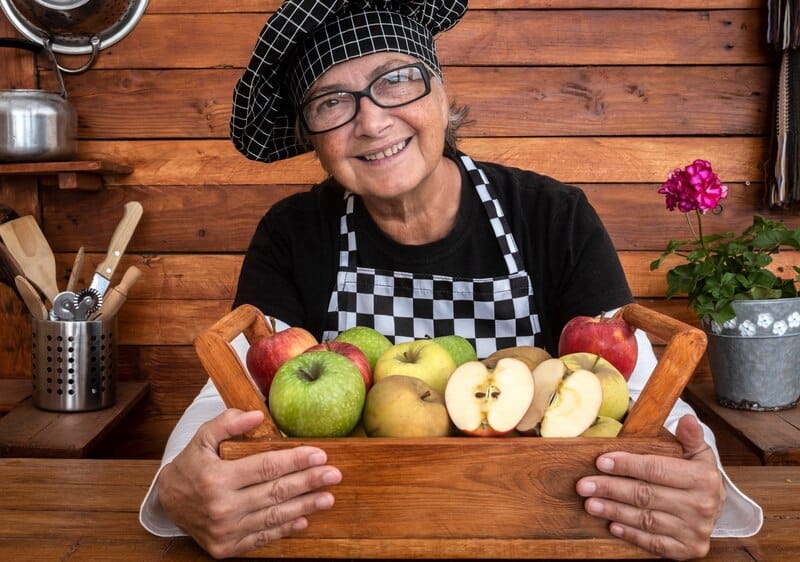According to the findings of a study that was recently published in Osteoporosis International, older persons, and more specifically women, who consume a diet that is predominantly composed of plant-based foods have a significantly reduced chance of developing osteoporosis.
According to a new study that was recently published in the scientific journal Osteoporosis International, older persons, and particularly women, who consume a diet that is predominantly composed of plant-based foods may be at a decreased risk for developing osteoporosis.
Osteoporosis is a prevalent kind of chronic bone disease that typically affects older persons and is characterized by a loss of bone mineral density and bone mass as well as alterations in the structure and strength of the bone. This can result in a reduction in bone strength, which in turn can increase the likelihood of bones breaking.
The authors of the study believe that a large number of minerals included in plant meals are essential for the prevention of osteoporosis. Yet, there is still a lack of consensus regarding how plant-based diets and osteoporosis are connected to one another. The purpose of this study was to evaluate the cross-sectional association between plant-based dietary patterns and osteoporosis in older persons. Specifically, the participants were older adults.
Bone health and a diet rich in plant foods
The research was carried out between 2019 and 2021 and comprised 9,613 participants who were over the age of 60 from nine different villages in China. These individuals were asked to respond to a questionnaire regarding their demographic features as well as their eating habits. The subjects were also put through an HBF-701 body composition analyzer test, which measured their skeletal muscle mass.

Heel ultrasonography was used to diagnose osteoporosis, and the threshold for the condition was a T-score of 2.5 or lower (where 0 indicates the usual, healthy bone density of a 30-year-old).
The total number of people who participated in the study had 1,848 cases (19.2 percent) of osteoporosis, 37.7 cases (31.7 percent) of hypertension, 19.4 cases (19.4 percent) of diabetes, and 12.2 cases (12.2 percent) of a previous fracture.
The researchers found that a healthy plant-based diet was associated with a “significantly” lower risk of osteoporosis, while an unhealthy plant-based diet was associated with a higher risk. This was the conclusion they reached after taking into account the patient’s family history of the disease and other risk factors. The foods that were shown to have the most positive benefits on one’s health were those that had whole grains, fresh fruits and vegetables, nuts, legumes, and tea. On the other hand, the foods that were found to be the least healthy were refined grains, sugary beverages, and sweets.

Apart for the influence of healthy plant foods on osteoporosis risk based on sex and age, there were no significant interactions detected between subgroups and plant-based dietary indices in risk for osteoporosis when subgroup analyses were performed. These interactions suggested that increasing one’s consumption of healthy plant foods had a stronger beneficial effect on preventing osteoporosis among women and those older than 80 years of age, in comparison to men aged 80 years and younger.
According to the findings of the study, “Older persons, particularly women, consume more healthy plant foods and reduce their consumption of animal foods and unhealthy plant foods, which was related with a lower risk of osteoporosis.”
Plant based diet for senior citizens
A plant-based diet has been shown in past research to be beneficial to older persons in a variety of ways, one of which is a reduction in the chance of developing osteoporosis. According to the findings of a study that was just published in the peer-reviewed scientific journal Journal of Cachexia, Sarcopenia, and Muscle, substituting plant protein for animal protein may be associated with a reduced risk of frailty in older women.

In older persons, frailty is a prevalent phenomenon that is defined by exhaustion, reduced walking speed, weak muscle strength, and accidental weight loss, among other characteristics. Frailty is also accompanied by other symptoms such as Alzheimer’s disease and Parkinson’s disease. More than 13,000 distinct instances of frailty were found across the board by the researchers.
It was found that reducing the amount of animal protein, dairy protein, or non-dairy animal protein (including protein from meat and eggs) in one’s diet by five percent and increasing the amount of plant protein in one’s diet was associated with a reduction in the risk of frailty by 38, 32, or 42 percent, respectively.
According to the findings of the study, consuming dairy protein rather than animal protein derived from sources other than dairy was related with a 14% reduced chance of becoming weak.
The results of some preliminary studies conducted by the Rush Institute for Healthy Aging suggest that older Black adults in the United States who consume a diet that is primarily composed of plant-based foods may experience a markedly reduced rate of cognitive decline. The outcomes of this study indicated that eating a healthy plant-based diet delayed the decrease in cognitive ability, perceptual quickness, and episodic memory (the capacity to recall personal events associated with a particular time and place) for black adults more so than it did for white adults.
Another study that was published in the medical journal American Journal of Lifestyle Medicine found that older persons who consumed a vegan diet required fewer drugs than those who did not. This finding was based on the findings of the study. Polypharmacy, which is when a person takes five or more prescribed medications, carries an 88 percent higher risk of adverse drug events as well as higher mortality rates. The researchers who conducted this study investigated the link between diet and polypharmacy. Polypharmacy is when a person takes five or more prescribed medications.
The findings of the study, which comprised the examination of data provided by 328 participants aged 60 years or older, led the researchers to the conclusion that older persons who adhere to a vegan or vegetarian diet are better able to protect their health.
The authors of the study came to the conclusion that eating a healthy diet, particularly a vegan diet, may be protective in the sense that it may lead to a reduced number of pills being taken. This could happen either by preventing the development of risk factors and/or cardiovascular disease or by helping on the controlling of such conditions. “Our results show that eating healthy, especially a vegan diet, may be protective in leading to a reduced number of pills taken.”








